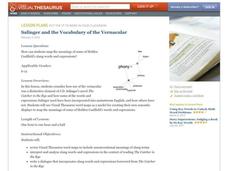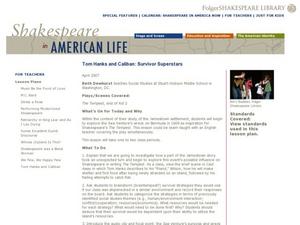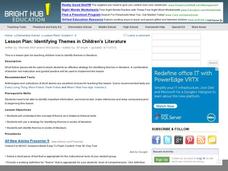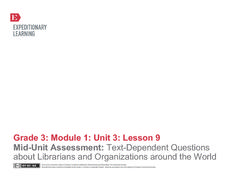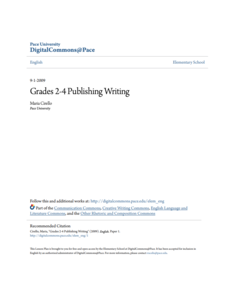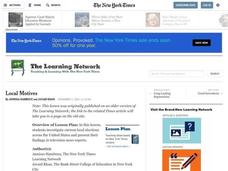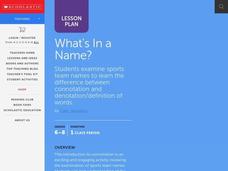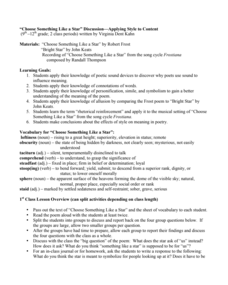EngageNY
Grade 11 ELA Module 2: Unit 1, Lesson 17
Scholars enter the midpoint of the unit and connect all the previous 16 lessons about the text "Of Our Spiritual Strivings." They complete a Mid-Unit Assessment that requires a multi-paragraph response to a writing prompt.
Curated OER
Salinger and the Vocabulary of the Vernacular
Writers explore vocabulary and expressions used in the English language. They use visual word maps to become aware of the different uses of words which will allow them to more readily interpret texts. Then they listen to/read excerpts...
Shakespeare in American Life
Tom Hanks and Caliban: Survivor Superstars
Here’s a clever way to combine language arts and social studies. Shakespeare’s The Tempest is believed to have been inspired by the wreck of the Sea Venture on Bermuda in 1609. The class views a brief scene from Castaway in which Tom...
Columbus City Schools
Poetry Speaking and Listening Standards
Celebrate April's National Poetry Month or enrich a poetry unit with a wealth of language arts material. Class members develop an oral interpretation of a poem and/or develop a podcast interview with a poet.
Utah Education Network (UEN)
Evaluating the Format of Informational Text
Make your learners aware of the advantages and disadvantages of using different media in presentations. This straightforward resource evaluates media formations such as print, digital text, and videos. Although the subject of ballet is...
Curated OER
Identifying Themes in Children's Literature
Identifying themes in literature is the focus of the language arts lesson plan presented here. Learners read short pieces of fiction and practice the skill of identifying the themes present in each one. The bulk of the lesson consists of...
EngageNY
Mid-Unit Assessment: Answering Text-Dependent Questions About Librarians and Organizations Around the World
This is a skills-based assessment that asks test takers to use textual evidence to determine the main idea of an excerpt from an informational text as well as respond to text-dependent questions. The assessment is the middle point...
School Specialty
The Tortoise and the Hare - Drawing Conclusions/Predictions Outcomes
Does the fastest one always win the race? Look deeper into The Tortoise and the Hare with a set of discussion questions for before, during, and after reading the story.
National Council of Teachers of English
Timelines and Texts: Motivating Students to Read Nonfiction
With the emphasis on incorporating more nonfiction in language arts classes the question arises about how to design activities that motivate kids to engage with informational text. How about an assignment that asks class members to...
EngageNY
Close Reading: Paragraphs 1–5 of “Water Is Life”
Be more specific. Scholars take a look at domain-specific vocabulary by discussing an anchor chart. They then look at vocabulary words recorded from paragraphs one through five in Water of Life. After analyzing the vocabulary used in the...
EngageNY
Close Reading of Bullfrog at Magnolia Circle: Predators and Prey
Reading is fantastic, especially when it's reading about bullfrogs. Kids get cozy with predator/prey relationships as they hone their information-reading skills. They start out as they read a portion of the text aloud, then they...
Education Closet
West Side Shifts
Combine math, language arts, music, and dance with an activity focused on "America" from West Side Story. After listening to the song, learners compare the film to Romeo and Juliet, analyze the song's meter, design choreography, plan...
Pace University
Publishing Writing
Scholars become familiar with tagline literature with the help of the story, Alexander and the Horrible, No Good, Very Bad, Terrible Day by Judith Viort. After a read-aloud and whole-class discussion, leveled groups complete several...
Curated OER
Local Motives
Investigate current local elections across the United States with this New York Times reading activity. Using informational text, middle and high schoolers research local elections and create their own news reports about what they...
Curated OER
Asking the Questions and Questioning the Answers
What would you ask a presidential candidate if you had the chance? Bring politics to your language arts classroom with this lesson, in which young readers brainstorm questions they would have liked the presidential candidates to answer....
Curated OER
What's In a Name?
Introduce your language arts class to connotation, denotation, and diction. Middle schoolers identify and differentiate between the connotative and denotative meanings of words by analyzing the fictitious sports team names. Learners...
Lakeshore Learning
Winter Bear Warm-Up
Don't be left out in the cold, ensure young learners are prepared for the winter weather with this clothing activity. After introducing them to different clothing items using the provided picture cards, students sing a song before...
Curated OER
Language Arts: Writing Skills Development
Students improve writing skills by expanding their self-perceptions. Next, they develop idea lists for writing topics. Their ideas become the basis for a class newspaper. following the creation of a group composition, students write...
The New York Times
Collateral Damage? Researching a Connection Between Video Games and Violence
Hook your class into an exploration of and discussion about violence in video games with a cute animal clip and a video game trailer. After a quick discussion about how media can affect mood, class members read a related article and...
Curated OER
The Adventures of Huckleberry Finn: Problematic Situation
Individuals read a series of passages from The Adventures of Huckleberry Finn, rank the statements from the least to the most racist or stereotypical, and share their rankings and rationales in small groups before a whole class...
Museum of Disability
Don't Call Me Special
Introduce young learners to the idea of disabilities and making friends with children who are different than they are. Using Don't Call Me Special - A First Look at Disability by Pat Thomas, learners are guided through the new vocabulary...
Vocabulary A-Z
5-Day Vocabulary Teaching Plan
Reinforce important reading skills with a set of vocabulary lesson plans. Middle schoolers complete sentences, play word games, finish analogies, and build their growing vocabulary with a packet of helpful and applicable graphic organizers.
Robert Frost Farm
“Choose Something Like a Star” Discussion—Applying Style to Content
Robert Frost's "Choose Something Like a Star" and John Keats' "Bright Star" provide the text for a two-part instructional activity in which class members analyze the effects of style on meaning in poetry. Randall Thompson's song cycle...
Curated OER
Language Arts: Biography and Autobiography
Learners examine autobiographies and biographies through a series of reading and writing exercises. By writing journals during this semester-long course, they improve writing skills and discover their own voice. Among other activities,...



